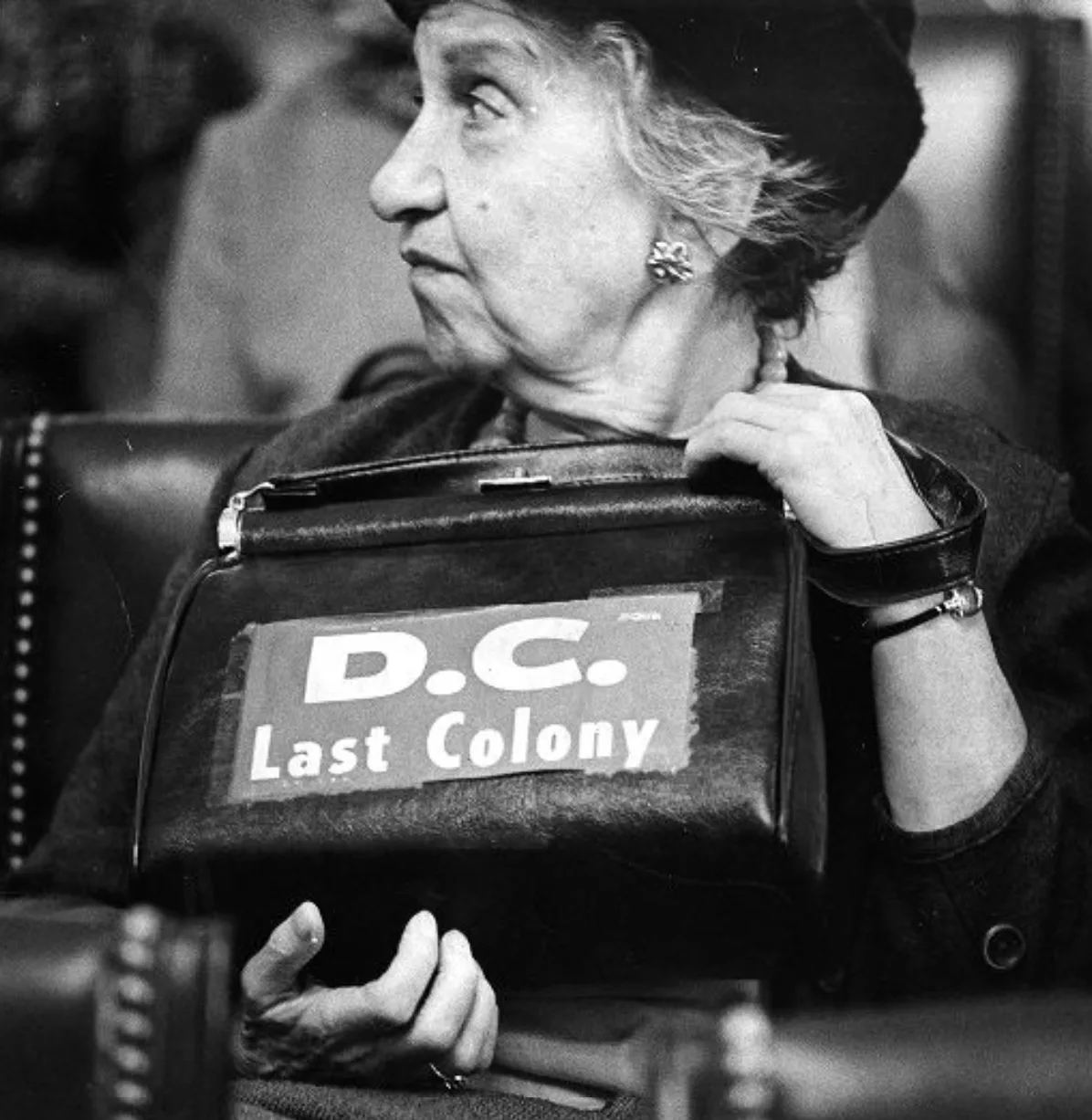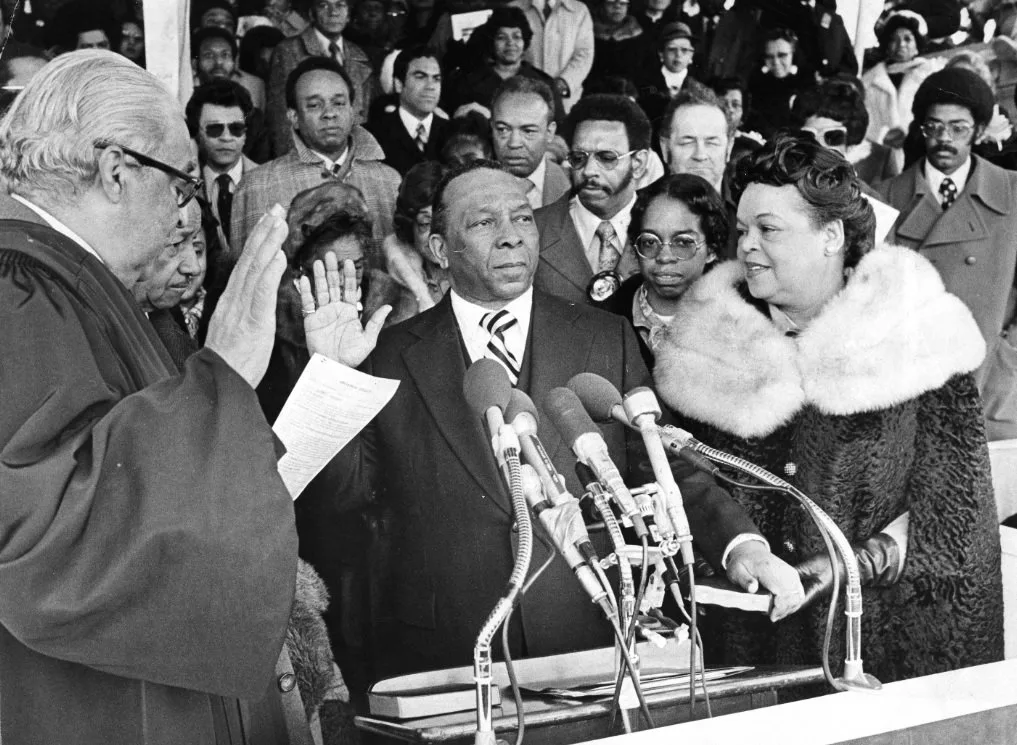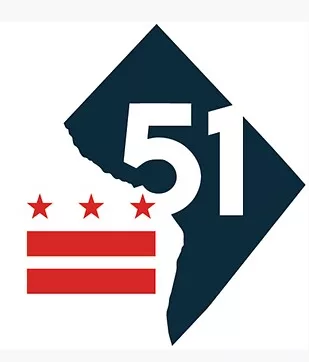
The Last Colony: An American Political Tragedy

(DC Library DC Voting Rights Collection)
I’m old enough to remember when Home Rule was an exciting new condition for the District of Columbia! I was a senior at Trinity when Congress enacted the Home Rule Act, signed into law by Republican President Richard Nixon on December 24, 1973 — a merry Christmas for D.C. citizens that year! The law made it possible for the citizens of this jurisdiction to elect their own mayor and the members of the Council of the District of Columbia! We take it for granted today, but prior to 1974, the president of the United States appointed commissioners to manage the affairs of the District of Columbia. While in the earlier decades of the 19th Century DC residents had some limited self-government, voting rights were limited to white male property owners. Congress gave Black men in DC the right to vote in local elections in 1867, but after Black men nationally won voting rights with the passage of the 15th Amendment to the Constitution in 1870, Congress pulled back on self-government for DC by changing the form of local government from elected officials to appointed commissioners.
The right of DC residents to self-governance was always deeply constrained — the right of DC citizens to vote in presidential elections only came along in 1960, and to this very day DC has no voting representatives in Congress. DC Delegate Eleanor Holmes Norton is the non-voting representative. In the history of the District’s struggle for full rights for self-governance, some activists came to call the District of Columbia “The Last Colony.” Racism was the clear underlying historical and still-raw current force limiting the ability of DC residents to have full power over their own affairs.

(DC Library DC Voting Rights Collection)
Walter Washington, who had been the last presidentially-appointed commissioner, won the 1974 election to serve as the very first mayor of D.C. at the dawn of the Home Rule era. When he took office he was one of only three Black mayors of major cities in the U.S. In the photo above, legendary Supreme Court Justice Thurgood Marshall swears-in Mayor Washington as Mrs. Bennetta Washington looks on. In June 1974, at my graduation from Trinity, Walter and Bennetta Washington spoke and received honorary degrees.
As a law student at Georgetown, I had the distinct privilege of working for one of the great members of that first Council of the District of Columbia — the fiery civil rights champion Julius Hobson, Sr. Hobson was critically ill and would die in early 1977, but he was a force of nature demanding that the newly elected Council not waste any time enacting legislation to improve life for the citizens of D.C. That first Council included numerous amazing early D.C. leaders including Sterling Tucker, David Clarke, John Wilson, Polly Shackleton, and a young civil rights firebrand named Marion Barry.
But the Home Rule Act was always something of a chameleon, a liberating force except when it wasn’t, a source of enfranchisement for DC residents except when Congress chose to disenfranchise them. The Home Rule Act always seemed to treat DC residents and their elected officials as something akin to a junior high student government — kids allowed to play at self-governance for some issues, but always aware that Father-Knows-Best (i.e., Congress) could take over and veto any locally enacted legislation at just about any time. Infantilizing the residents of DC by curtailing their ability to make their own political decisions was and is and continues to be a grave insult and injustice, and clearly driven by the virulent racism of those who seek to deny Black persons full enfranchisement. The constant threat of overseers who do not live here choosing to block DC legislation is a gross denial of the fundamental American principle of citizen self-determination.
Now DC is on a collision course once more with Congress, and, in a surprise, the White House as well. The issue is the DC Council’s overhaul of the city’s criminal code which includes some controversial changes in sentencing. Observers could see this train wreck coming from miles away: Republicans took over control of the House of Representatives in January; Mayor Bowser vetoed the bill but the Council overturned her veto; violent crime has skyrocketed in DC recently; and President Biden and many Senate Democrats are calculating their risks for the 2024 elections. The House overwhelmingly voted to block the DC legislation, and the vote included a substantial number of Democrats who otherwise might support DC voting rights. It appears that Democrats in the Senate might also vote against the DC bill, and President Biden announced yesterday that if Congress blocks the bill he will not veto the Congressional resolution blocking the bill.
Shock, outrage, and cries of hypocrisy now echo across the District. The impending Congressional action, with apparent White House support, will be a major setback for self-determination for the citizens of the nation’s capital. Recriminations are fierce: some accuse the mayor of undermining Home Rule by vetoing the bill, thus sending a message to Capitol Hill that it’s ok to block the legislation. Mayor Bowser denies this. Some say the Council should have exercised greater prudence in crafting the legislation; Councilmembers point out that’s supporting the patronizing oversight of Congress. President Biden claims he still supports full statehood for DC, but so long as the law allows him to block what he considers to be a bad piece of legislation, he will do so. He specifically noted the bill’s reduction in the severity of sentencing for carjackings at a time when that crime is constant. Critics cry hypocrisy since Biden earlier said he would veto any effort to block DC legislation. Presidential hypocrisy is just politics by any other name.
The president’s decision is clearly a matter of political expedience. He — and his fellow Democrats — do not want to give Republicans an opening to pin the “soft on crime” label on them as the 2024 political campaigns heat up. It’s clear evidence of the lack of any real power among DC citizens and politicians that their outrage over the president’s lack of respect for local legislation has no impact. DC simply does not count in anyone’s political calculus; this jurisdiction carries zero weight in federal elections.
Realpolitik rules when the likes of Donald Trump and Ron DeSantis are gearing up their campaigns against Biden and Republicans are aiming to take over the Senate. 2024 is starting, and it’s gonna be ugly.
 But that realpolitik also underscores the real political tragedy that is the District of Columbia’s ongoing disenfranchisement, a type of colonial status that we might have thought was long gone. Home Rule was never really full self-governance; that legislation always came with the threat of disenfranchisement at the hands of members of Congress who would probably have a hard time finding their way home from the intersection of Minnesota Avenue and Benning Road. Gutting Home Rule does not make anyone safer in the city, or more likely to make DC a good home for Congressional elites. The ruling class (who, by the way, love to rail against the evil “Washington” that is their source of power) have little knowledge of the real lives of the real citizens of DC, what local citizens truly need and desire in local government, and how so many are working together to build strong and vibrant communities.
But that realpolitik also underscores the real political tragedy that is the District of Columbia’s ongoing disenfranchisement, a type of colonial status that we might have thought was long gone. Home Rule was never really full self-governance; that legislation always came with the threat of disenfranchisement at the hands of members of Congress who would probably have a hard time finding their way home from the intersection of Minnesota Avenue and Benning Road. Gutting Home Rule does not make anyone safer in the city, or more likely to make DC a good home for Congressional elites. The ruling class (who, by the way, love to rail against the evil “Washington” that is their source of power) have little knowledge of the real lives of the real citizens of DC, what local citizens truly need and desire in local government, and how so many are working together to build strong and vibrant communities.
Crime in the city is a serious problem, yes — as it is all over this country. The crime problem will not go away by having Congress treat DC’s elected leaders like bad children. Yes, maybe the crime bill deserved the Mayor’s veto — that’s an effective exercise of local power, as was the Council’s exercise of local power in over-riding the veto. We can debate the merits of the legislation without giving away the rights of citizens to govern their own affairs.
Statehood is, in fact, the only real solution to the continuous and grave threats to full citizenship for DC residents. But statehood remains an impossibly elusive goal with the current composition of Congress. For now, the Mayor and Council need to figure out a solution that can salvage some independent governance for the District of Columbia. They need to be soberly realistic about the realpolitik of the current national moment. This is a moment that demands courageous, smart and effective local leadership to repair the damage to self-governance and restore some confidence among the federal overseers that DC really can and must govern its own affairs.